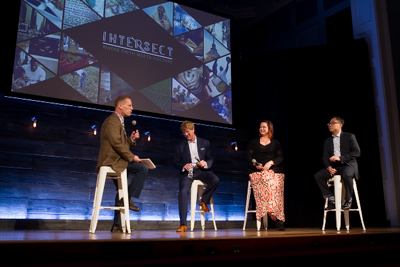Intersect: The Wisdom Forum
January 19, 2017

 Southeastern welcomed over 400 pastors, students and members of the local community on the evening of Friday, March 13th for an evening of conversation addressing faithful interaction with today’s cultural issues.
Southeastern welcomed over 400 pastors, students and members of the local community on the evening of Friday, March 13th for an evening of conversation addressing faithful interaction with today’s cultural issues.
A partnership between The Kern Family Foundation and SEBTS opened the door to examine these topics.
The event consisted of a series of brief, compelling presentations from eight speakers who sought to answer the question: how one can impact God’s kingdom through work?
Jay Richards, NY Times bestselling author and assistant research professor at Catholic University of America, gave two talks titled “Why Good Intentions Aren’t Good Enough” and “Why Christians Should Support Economic Freedom.”
“If you help someone out of pride it takes a moral act and makes it an immoral act,” Richards said.
He highlighted the need to anticipate the consequences of a policy before it is enacted. “Promote effective solutions that are not random acts of kindness,” he said. “The trillion dollar question is, and then what will happen? Good intentions aren’t enough.”
Richards also explored the conditions that allow people to flourish. He believes free enterprise is the best option available today.
David Kim, executive director and pastor of faith and work at Redeemer Presbyterian Church, talked about “Why We Can’t Love Our Work” and “Tangible Expressions of Glory.”
“The reason we can’t love our work is because our work can’t love us; we want it to do something it’s not designed to do,” he said. “Work was never meant to be our identity but an expression of it. It flows out of who we are as God’s dearly beloved children.”
“The product of our hands is an expression of our identity,” he said. “The chief end of man to enjoy God and glorify him.”
Carolyn McCulley, author, speaker and filmmaker, spoke on “The Story of Work” and discussed whether or not women should work.
“If we don’t know the story of work, can we be sure that we don’t make the error of reading our own modern experience into the scriptures?” she said. “Paul saw that women’s work was strategic, and it was an important part of the gospel. Paul partnered with women to advance the gospel.”
“Should women work? Yes, they should work very hard and work hard for the glory of God,” she said. “But it takes extra wisdom in a culture that separates productivity from parenting.”
Bruce Ashford, SEBTS provost, dean of faculty and associate professor of theology and culture, spoke on the misconceptions of culture.
Ashford defined culture as “what happens when God’s imagers interact with God’s good creation.” He offered three mindsets of the church relating to culture. “The first mindset is the church as bomb shelter; the second is the church as ultimate fighter; and the third and best is the church as a preview of the kingdom.”
David Jones, associate professor of Christian ethics at SEBTS, taught on “Socialism, Communism and the Early Church. Oh My!”
He used select passages in Acts to remind Christians that they “are not called to pursue economic equality; rather, believers are called to promote economic justice because God is not concerned about how much you have but what you do with it.”
Benjamin Quinn, assistance professor of theology and history of ideas, spoke on the need for Christians to see value in their ministry regardless of their job title.
Quinn believes there is a “deep divide between the pulpit and the pew that should have never existed to begin with. There is a centrality of those ordained to ministry but not a superiority,” he said.
Walter Strickland, special advisor to the president for diversity and instructor of theology at SEBTS, spoke on “Neighbor Love, the Poor, and My Garden.”
Strickland explored the questions, “What does it mean to be a Christian and see such need and poverty?” and “How can I utilize what God has given me to love God and then love my neighbor?”
He encouraged listeners to seek long-term poverty alleviation through healing relationships in light of the fact that people are created in the image of God.
Heath Thomas, associate professor of Old Testament and Hebrew at SEBTS, gave a “portrait of a life worth living.”
“A life well lived is not measured in tweet-able quotes but in the fear of the Lord,” he said. “A life well-lived begins and ends with the faithfulness of God and our faithfulness and trust in God.”
The evening concluded with a panel moderated by Ken Keathely, SEBTS professor of theology and director of the Center for Faith and Culture, and included Kim, McCulley and Richards.
The faith, work and economics talks enabled attendees to grasp a deeper understanding of these topics to impact the way they do business.
Admission was free and guests were provided complimentary coffee, dessert and books. The first 300 people to register received: “When Helping Hurts,” by Brian Fikkert & Steve Corbett; “Flourishing Faith: A Baptist Primer on Work, Economics, and Civic Stewardship,” by Chad Brand; and “Art & The Bible,” by Francis Schaeffer.
To view The Wisdom Forum talks online and access more of the Intersect Project resources, visit intersectproject.org. http://intersectproject.org/